'Nathan Burgoine's Blog, page 117
December 23, 2015
Writing Wednesday – You Can Quote Me On That
When it comes to writing, I hear a lot of authors saying how much they can’t stand writing their blurbs. Be that the back-cover blurb, or the one- or two-liner used for other things like catalogs, they seem to be more-or-less universally despised.
I actually don’t mind them at all, and enjoy writing them. It might be the bookseller in me. I see the back cover write-up as basically the same thing as a hand-selling pitch from me to the potential reader. So they don’t bother me much.
The dreaded bio? That I don’t love, but I’m willing to work on it, and hey, it got easier once I broke the two-dozen mark for short stories, as I could simply say “‘Nathan has published dozens of short fiction pieces…” rather than flail about trying to figure out which short story anthologies to mention. Oh, and having written a novel helped, too. I generally lead with that now.
And the dog. Gotta mention the dog.
So, really, blurbs and bios don’t much worry me.
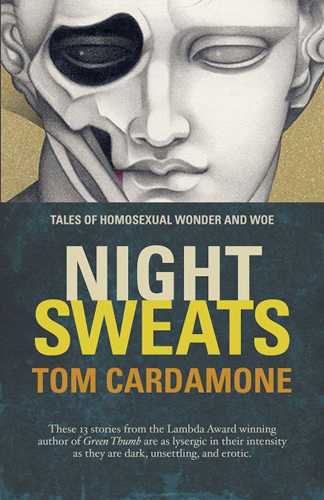 Then I got asked for a support quote. From freaking Tom Cardamone!
Then I got asked for a support quote. From freaking Tom Cardamone!
First thought? Oh my gosh! I’m so freaking beyond flattered! I love this guy’s writing, and he wants me to say something for his book? That’s insane! That’s a dream come true! Of course I’ll do it!
Second thought? Wait. What do I say? I need this to be awesome. Because he’s awesome. Oh crap.
I sat down, and had a good think, and then thought some more. I read the reviews I’d written of his previous work. I re-read some of his short fiction. I walked around my living room speaking out loud. And finally, I sent him what I hope was a useful, helpful quote for his book.
Said book, Night Sweats, comes out next month. Y’all know how I feel about short fiction, and I’m going to be devoting some of my Sunday Shorts days to the collection (which I’m loving, not that there was any doubt about that).
But yeah. Book quotes. Turns out those are really, really hard to do. You want to say something honest and encouraging and hopefully something that will tip someone on-the-fence over to the yes-I-want-this side. And it comes with a healthy dollop of and who the heck am I to be giving people this advice?
But again, before I was anything else, I was a bookseller.
Thankfully, that doesn’t go away.


December 22, 2015
Advent

When I was a kid, I usually had the sort of advent calendar that had a wee bit of (not-so-great) chocolate behind little cardboard doors. I’d be over-the-moon to open them up every day and see what it was, and had to balance begin given permission to do so (chocolate is not to be had before breakfast, I was told) and open it before my sister could gloatingly tell me what was behind that little door for the day (older sisters, am I right?)
It was a fun tradition, and really did add that little bit of joy to my season when I was young.
As I got older, of course they vanished. I’m not sure when exactly, but one year it wasn’t there, and I probably didn’t mind (after all, when you hit that tween age, you start to think the only thing in the world you want is to be treated like an adult).
But now, as an adult, I love them again. I get a LEGO City advent calendar every year, and I put the little pieces together, and yes, it adds joy to my season. We have a whole LEGO Christmas village, actually, and that sucker is awesome (see one small piece of it above, there) and we add to it when LEGO releases the holiday sets. The LEGO City advent calendar pieces often get added to that village, too.
As an author, I’ve often wondered about doing some sort of “advent” thing. I took part in one once, and it was interesting: each author wrote one of pieces for the twenty-four days of December, and each day held a prize that could be won by someone commenting on the post.
Maybe next year I can figure something like that out, now that I’m not racing to and from work every day in December.
What about you? Do you have an advent calendar? Is it chocolates? Toys? Twenty-four bottles of wine? Let me know…


December 21, 2015
Saints & Sinners Short Fiction Contest Finalists

The second newsletter listing the finalists from the Saints & Sinners Literary Festival is out, and so now I can bring you the full list.
Huge congratulations to my fellow finalists! The finalists (and their short stories) are:
Rich Barnett: The Most Unusual Sweet Potato Competition
Sally Bellerose: Discretion, 1957
‘Nathan Burgoine: Sweet William
Jerry Rabushka: Trumpet in D
Carol Rosenfeld: Fallen Angel
Vince Sgambati: Emmas
Chris Arp for “A Man A Man”
N.S. Beranek for “Do Unto Others”
Bryan Collins for “The Weirding Path”
Darrow Farr for “Last Dance”
John Florio for “King of the World”
Aaron Hamburger for “Loo Rolls”
Thomas Westerfield for “Mr. Sissy in Sin City”
Andrew Willett for “The History Professor”
I always look forward to New Orleans, and the Saints & Sinners Literary Festival itself, but this? Icing on the beignet. In mid-January, they’ll announce the winner and two runners-up along with information about the 7th annual book launch party.
Are you heading to Saints and Sinners? If so, let me know. I’d love to say hello.


December 20, 2015
Sunday Shorts – The Holiday Hoax
Another audiobook that I listened to recently to get into the holiday mood (a thing I still sometimes struggle with, given the ghosts of retail Christmas past), The Holiday Hoax by Skylar M. Cates hit the sweet spot in all the right ways.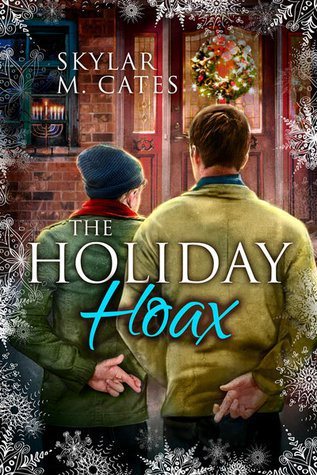
First, the audio narrator K.C. Kelly, did a great job. The vibe of the story never got too serious despite a few very heavy moments, and Kelly held that note audibly throughout. The narrator can make such a big difference (for good or bad) in the audiobook version of books, and I wanted to point that out right off: t’was well performed.
The story itself is basically an extended meet-cute: Evan, a cute drama student (who is very dramatic in all sorts of ways) gets dumped shortly before Christmas break, and is cringing over the realization that his parents can’t wait to meet his new boyfriend, who he’s been telling them about for weeks. He’s dreading showing up alone, because that will mean pity and sad looks and an awkward Christmas and Hanukkah for everyone – especially him.
Evan wanders off to a coffee shop to ponder this misery, and happens to see a guy he kinda-sorta knows from school, J.D. They sit and have a good little chat, and then J.D.’s brother shows up, Evan moves to another table to give them room – and then watches in horror as the brother completely rejects J.D. when J.D. comes out to him. The campus is closing soon for the holidays, and J.D. is going to fly solo for Christmas…
A plan is born.
Evan takes J.D. home for Christmas, in the guise of J.D. being the boyfriend his family is so looking forward to meeting. But J.D. is a farmer’s son, and the boyfriend was a globe-trotting son of a diplomat, and carrying off the deception isn’t going to be easy. And it’s definitely not helped by Evan’s growing feelings for J.D.
This novella is a short, sweet ride, and perfect for a holiday listen. I chuckled and grinned my way through it, and ended with a smile on my face.


December 19, 2015
Saturday Sounds – Christmas Kitsch
One of the best things for me during the holiday season when I was working insane hours as Christmas approached was audiobooks. I had a long commute, and I was on the bus, and physically reading a book on the bus made me feel a little ill. Audiobooks were just the ticket. I’d listen to a book both ways (often an hour on the way to work and an hour a half on the way back). For the longest time, this was how I listened to bestsellers and other major titles I was supposed to keep up on for my job at the bookstore, and I did find quite a few new authors that way.
Then, a couple of years ago, I started to say gay books becoming audiobooks. This was freaking awesome. I also started to see novellas, which I happen to love, and when turned into an audiobook, they would last me a few days at most, rather than a week or two, and as the worst of the holiday season would come, that was even better: I didn’t have to try and maintain concentration over a long period of time.
Did I mention working Christmas retail is mentally depleting?
Since I’ve stopped working at the bookstore, I’ve been trying to restore my Christmas Spirit. Last year, the novelty of my first Christmas not working in decades was incredible, but it still felt “off” and strange not to be going a bit crazy. This year is no different, though I’m finding a bit more joy in the day to day, and making a more concerted effort to actively seek out the cheer.
Hence all the queer holiday books and audiobooks I’ve been finding.
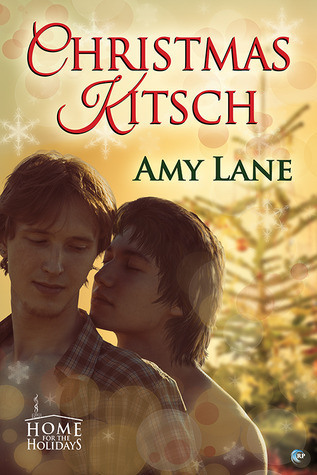 The latest one I just finished yesterday was Amy Lane‘s Christmas Kitsch. This one has so much to recommend going for it for fans of m/m romance.
The latest one I just finished yesterday was Amy Lane‘s Christmas Kitsch. This one has so much to recommend going for it for fans of m/m romance.
The main voice of the story is Rusty, a big jock of a guy who self-admits to not being that bright. He’s not hopeless: give him time, instructions, and repetition, and he’ll figure things out, but he’s not instantly-bright or quick. He’s rich, from an entitled background, blond, and pretty much the typical wet-dream son of the wealthy white family. And when he meets Oliver, things start to go south.
Oliver isn’t white. Oliver is very clever. Oliver speaks his mind. Oliver is gay. And Oliver becomes Rusty’s best friend, much to the chagrin of pretty much everyone in Rusty’s life, with the exception of Rusty’s sister, who struggles to fit their parents’ idea of what she should be.
If you’ve read any m/m, you know the inevitable is coming, and of course it takes Rusty (again, not-so-quick a guy) a while to figure out why he’s so drawn to Oliver, but when he does, things go downhill, fast. By the end of Thanksgiving, rich, cared-for Rusty is out in both senses of the word: he admits to being with Oliver, and gets kicked to the curb by his parents.
This is where the story really takes off for me: Rusty has to make a new home, a new support network, a new plan, a new everything. This was my experience. This was the experience of so many queer people I know. And it’s handled deftly, if in the positive and warm-feelings way of a romantic novel set leading up to Christmas. I especially loved in the inclusion (even in a minor way) of Rusty’s college roommate’s parents—”the Moms”—and the message they send to Rusty through their son when everything hits the fan.
As far as Christmas listens go, this was lovely. I enjoyed it over the course of a couple of days of chores and even took it with me when I went to pick up my last couple of stocking stuffers, and finished it just as I was wrapping the last present. The performer is solid (though sometimes it’s a little obvious when the performer took a break and came back to recording, as his voice sort of “resets” a bit and it takes him time to get back into character). And if maybe even the former not-so-great people in Rusty’s life get a shot at a bit of redemption, I can live with that. It’s a Christmas story. It can be happier than real life typical turns out to be.


December 18, 2015
An Ornamental Addendum
I don’t really have much in the way of little people in my life. When you’re a queer couple without kids with mostly straight married friends, you end up entering the “baby pit” years. Your friends sort of drop off the Earth for a while, as one by one they give up sleep, socialization, and functional higher-language use to devote their time to the wee people that just turned their entire lives upside-down.
(For the record, that’s totally what they should be doing. This is not me saying that parents should not spend the vast majority of their energy with their newborn kids. I’m not a monster.)
But watching everyone else experience something you know you won’t have? Sometimes, that’s hard. I saw it with marriages (and decided I didn’t want one at all, so there, right up until the law changed). When I saw friends having children, there was a part of me that had to step back. No matter how far we come with equal rights and protections, there will never be a child that is half-me and half-him, genetically speaking. There’s no surrogacy that can create that child. It cannot happen. There’s no magic, no treatment, no process. It’s a non-potential. And despite my opinions on how little I think blood matters, there are drives inherent in a human being that I possess as much as anyone else—someone born of myself and the person I love most..? Some part of my brain wanted that, and was reminded with every baby notice there was zero chance.
On the Joyful Occasion of So-and-So’s Birth! I’d read the cards. And underneath I couldn’t help but read nonexistent words: Reminder: You Don’t Get To Have This.
There are also so many kids out there without homes. Adoption exists, and I certainly have friends who are adopted, have adopted, and plan to adopt. Don’t get me wrong, my husband and I did have that discussion. But the realities of some of my health issues, things in the past, and the level of high scrutiny involved in a gay couple adopting left us deciding pretty clearly. No, we would not be parents.
Frankly, for the majority of the time, that’s okay. And over the last couple of years two things have happened. One: I’ve grown past that feeling of loss (most of the time). The older I get, the less it troubles me—while it seemed to be a major thing in my late twenties to early thirties, now I’m forty maybe the biological clock is just running down its batteries.Two: our friends are returning from the baby pits and becoming more able to be social again, and those babies are now little people. We’re not quite so alone or limited in our social engagements. We’ve played D&D with a friend’s eldest son (he plays an awesome monk). We have a goddaughter (in likely the loosest and most pagan interpretation of that title ever to exist). We play boardgames with these little people, and LEGO, and when we gather with their families, we have a good time, kids included.
So, when I had a visitor yesterday, one of these little people in question who likes board games and LEGO, and he gave us a present, it was heartwarming. 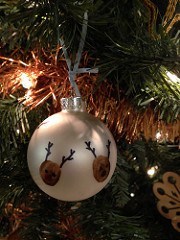
When I saw what it was? Those are his thumbprints made into reindeer, including a Rudolph with a red nose. It was pretty much all I could do not to cry on the spot.
I’m not sure how well I hid it. As you can see, it’s obviously made with love, and it’s in a position of honour on our tree. It’s also a little-person handcrafted ornament for the tree. That’s not the kind of thing I ever thought I’d get to have. Our tree tells the story of our lives. I can say that now, since as my husband pointed out, my tradition of an-ornament-a-year spread to him when we met, and now there are as many ornaments that are “us” as there are ornaments that are “me-from-before-I-met-him.” When we decorate the tree, that story gets retold, and it’s a joy to do so.
So now, when I go to visit my friends over Christmas, and I see their trees with the hand-made ornaments, I don’t think there’ll be as much bittersweetness to it.
There’s a little person story on my tree, too.


December 17, 2015
Throwback Thursday – Try, Try Again
Back in 2006, when I first started writing with the actual goal of getting published, my first two attempts were accepted. I was over the freaking moon. The first story was accepted for a collection called Moonlight and Roses, and the second for a collection of paranormal themed gay fiction (the working title escapes me).
Neither happened. They were both for the same publisher, and though I got paid for the first story—I was a paid author!—the publisher folded, and that was the end of that.
 So happy, and about to be so let down.
So happy, and about to be so let down.Well, except it wasn’t.
That first story for that first anthology got championed by its editors and a couple of years later found a new name and a new home, but that’s a tale for another day. The second story?
The second story had some of the worst luck of any story I’ve ever written.
It was called “Last Call,” and it was about Mark Ward, a gay private eye (ish) who happened to be both gifted with magic and the seventh son of a seventh son, which added to his power. And a demon hires him to find out who is trying to kill said demon.
The problem with “Last Call” was that it was kind of a specific story. It was about a gay guy, it was a paranormal, and it was a bit of a mystery. And while I continued to seek out new calls for submission and I wrote new stories for those calls (and had successes), I could not find a freaking home for this story. I had ideas for three sequels to the story, with the same character, but I didn’t work too hard on them given I couldn’t find a home for the first story in the first place.
Years went by. Seriously, years. It took half a decade of “Last Call” sitting in a folder, unloved, sent to a few calls that I thought might work (one a mystery anthology, one a contest, among others) and every time it was refused. Often it was declined with a very friendly letter telling me that it was a great story and had a really cool vibe, but it didn’t suit the anthology as a whole.
As far as rejections go, those are the best, by the way.
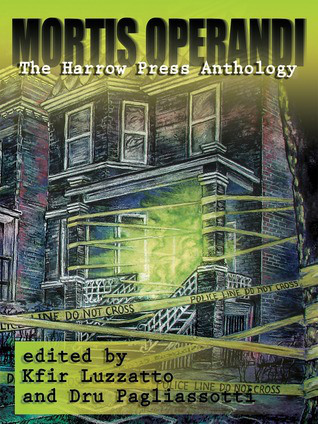 Then, in 2011, I saw a note for a call for paranormal mysteries. The thing was, it wasn’t for a gay publisher. I hemmed, and hawed, and then did a mental shrug and sent it in. I wasn’t going to pre-reject myself on the basis of a queer story.
Then, in 2011, I saw a note for a call for paranormal mysteries. The thing was, it wasn’t for a gay publisher. I hemmed, and hawed, and then did a mental shrug and sent it in. I wasn’t going to pre-reject myself on the basis of a queer story.
The editor liked it. And that’s how, after six years, “Last Call” got a home in Mortis Operandi. It was released almost three years ago to the day, December 16th, 2012. It was also the first time I was published in a collection that wasn’t specifically queer in theme (something I’ve only managed once more since). It was a fantastic reminder that a gay character didn’t only belong in a gay book, and it made me so damn happy. Also, I learned not to give up on a story if it was quirky or strange. It might be mine for a long haul, but it was still worth writing.
As for Mark Ward…I should probably do some work on those sequel stories, eh?


December 16, 2015
Writing Wednesday – And for my next trick…
It’s that time again. Last month, I did NaNoWriMo, and ended up drafting over 60k words in a single month. That was insane, and left me with drafts of five (and a half) novellas. I intend to work on polishing those, and then the struggle for finding them a home (or do I try the self-pub route?) Novellas are funny animals, and generally e-published, though I’m lucky enough that my first novella, “In Memoriam” was printed in a collection with three other novellas in On the Run.
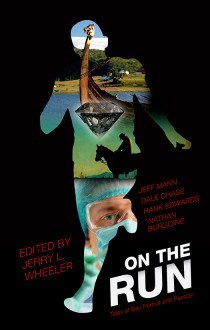 Part of last month was also sending in a pitch on the next novel I’d like to work on, which is Triad Soul (a second Triad-based story, though I’m hesitant to call it a “book two” or a “sequel.” I’m hoping that, for the most part, the books stand alone self-contained, with threads of larger tales running though, but not to write a trilogy or a series in the strictest sense.
Part of last month was also sending in a pitch on the next novel I’d like to work on, which is Triad Soul (a second Triad-based story, though I’m hesitant to call it a “book two” or a “sequel.” I’m hoping that, for the most part, the books stand alone self-contained, with threads of larger tales running though, but not to write a trilogy or a series in the strictest sense.
Part of sending in the pitch is giving yourself a deadline. Or, put another way, I had to let my publisher know when I could deliver a manuscript draft. I talked it over with my husband, who is—as you likely know—pretty much the smartest person I know, and he pointed out that last month I did indeed write 60k words. In a month. I tried to explain that was easier since it was five novellas, but he gave me a look that said, ‘Uh-huh. Give me another excuse.’ And the thing is, he’s right. Well, we’re both right. I do find it easier to write a novella than a novel, but there’s no reason I can’t write a bit faster on the next novel.
W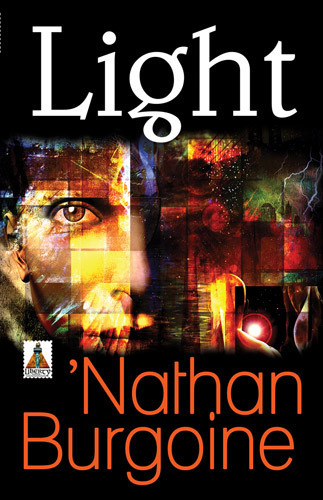 ith Light, it took me three years to write the first draft of the novel. I was working full-time, sneaking in writing time between short stories, and trying very hard not to burn myself out (did I mention I was working full-time?) I didn’t pitch the book until it was mostly written, and even then I was scrambling to get it done once I had a deadline.
ith Light, it took me three years to write the first draft of the novel. I was working full-time, sneaking in writing time between short stories, and trying very hard not to burn myself out (did I mention I was working full-time?) I didn’t pitch the book until it was mostly written, and even then I was scrambling to get it done once I had a deadline.
To this day, I’m stunned I managed to accomplish it on time, and I sent that sucker in with a profound sense of relief. It was hectic, but it was worth it, and it taught me something truly valuable about writing a novel: I needed to be way, way better at planning out my strategy. Novel writing was nothing like short fiction, at least not to me, and I made my work so much harder by not doing more prep-work.
When I sent in the pitch for Triad Blood, I had a bit more of an idea about what I was intending to do, but I had nothing really written ahead of time, beyond a couple of scenes I’d worked on that would become a part of Triad Blood after I’d realized they wouldn’t work in a short story I’d been trying to write for the same characters. That short story, in part, became one of the major plot-arcs in Triad Blood.
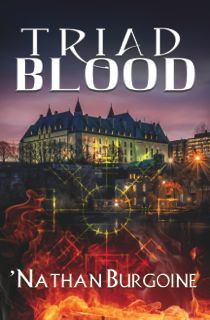
The pitch was accepted. My awesome publisher, Bold Strokes Books, wanted the manuscript… in a year.
To say I panicked would be understating. My husband listened to my panic, and we sat down and gave it a think. I had a week off from work, and that was the week I decided it was time to say goodbye to the full-time retail management job. The Monday after, I gave my notice, and though I allowed myself two weeks after my last day to take a breather, after that it was full-steam-ahead on the novel.
And I did it. In fact, I did it with time to spare – I was done a draft of Triad Blood two months early, though I tweaked and played with it for another month before I sent it to my beta-reading friends. It took me ten months (or eleven, if you count tweaking).
It turns out that like nearly any skill, practice helps you improve. I avoided pitfalls I’d dug for myself with my first novel and plotted out the notion of Triad Blood in much more detail before I started typing. And I’d picked up a neat tip from fellow writer Jeffrey Ricker about blocking major scenes on cue-cards, which I could re-arrange and lay out in front of me visually to see how things progressed. I colour-coded. I noted which characters appeared in which scenes. I saw problems before I created problems, and solved them preemptively. It was fantastic.
I also discovered new mistakes, but had far more time to deal with them.
So, I just gave myself a ten-month deadline this time, starting from next January. By the end of October, my goal is to have Triad Soul not only written, but tweaked and read by some beta-readers.
Deep breath.
Here we go again.


December 15, 2015
Last Christmas
 I keep my Christmas Cards from the year before, and pack them away with the decorations and wrapping and other holiday bits every year. It’s partly because I don’t like throwing them out—it seems sort of sad, no?—but also partly organizational. Nothing helps me keep track of my Christmas Card list like the actual cards from the prior year. It’s helpful.
I keep my Christmas Cards from the year before, and pack them away with the decorations and wrapping and other holiday bits every year. It’s partly because I don’t like throwing them out—it seems sort of sad, no?—but also partly organizational. Nothing helps me keep track of my Christmas Card list like the actual cards from the prior year. It’s helpful.
More than a few years ago, just after the holidays, my then-boyfriend (now-husband) and I went to the U.K. with his father, to visit his grandmother for the occasion of her ninetieth birthday. Between jet-lag and my usual inability to sleep, I was wide awake long before the sun, and when I quietly crept out of bed one morning to sit and read, I was surprised to see my husband’s Nan up already, also reading.
For ninety, Nan was a bright and present woman. She read voraciously, and did the daily newspaper crossword puzzle (often completing it). She kicked butt at Scrabble, as I was to learn, and took no prisoners. I adored her.
That morning, though, we were still mostly strangers (and, I admit, I was very nervous). I wasn’t sure how she might feel about my presence; would I be seen as an interloper? An unwelcome reminder of something she perhaps didn’t like about her grandson?
The short answer was—of course—absolutely not. Her love for my husband was absolute, and she was a wonderful, charming person to chat with.
That morning, our first chat, we talked about our pasts and where I had grown up (I’m also British), and we laughed about some things I don’t really recall. Then, at one point, she was looking at the series of birthday cards lined up on the mantle, and she said, “There were more last year.” She counted them, then nodded. “Last year I had two more.” Then she paused, and tilted her head, and said. “Oh, of course. They died. That’s all right then.”
It was an odd moment. She said it with a twinkle in her eye, and I think that’s when I realized how sharp she was. We had a small laugh—I admitted I’d gotten less than half her number of birthday cards for my last birthday—and we moved on.
When I pulled out the Christmas Cards this year, I found Nan’s card from two years ago. It’s the last one she would send us before she passed, and her handwriting was somehow both lovely and wobbly all at the same time. Last year, I couldn’t bear to throw it out, and put it up with the rest. This year, I did the same, and it’s not the only card we have like that now.
It’s like an echo, really. Or maybe a visit of my version of the ghost of Christmas Past. But it’s lovely to see her handwriting, and remember that visit, and smile every time I look at the cards.


December 14, 2015
Dolph
He was named Rudolph when he was born, but like so many born different, he eventually shed the one he was given. And if it hadn’t been for a foggy night and a hard decision, the rest of us freaks would still probably be tucked out of sight, waiting to be useful in some way that pleased the perfect, and in the meanwhile, to hell with us…
But wait, I’m telling it out of order.
It doesn’t actually start with Dolph. It doesn’t start with Klaus, either, though it involves him.
If it’s not about Dolph and it’s not about Klaus, then where does the story really start, you wonder. Well, it starts with a woman. A woman both powerful and visionary, which is probably not the way you’ve heard it told before. Most of the time, in most of the stories, she doesn’t even get a name when she appears, but I promise you, she has one. And I promise you, she’s the one that mattered the most.
Every one knows about Klaus and his gift—though we’ll get to the truth of that in a second—but not very many know about her. It’s important to know where she came from, though. See, this woman, she was the one and only daughter of Father Time.
And, like most of the people in this story, she was gifted.
So when people talk about Klaus and his wife—and that’s always her role, isn’t it?—they never seem to mention how she’s one of a kind. And she truly was, for damned sure. And it’s her gift—to hold time at bay—that makes everything possible. She saved Klaus’s life, helped him find a purpose when he was ready to walk out into the snows and take a nap.
The thing about the big guy that no one really gets is he’s up there in the frozen nowhere because it’s where a guy like him needed to be to stay sane. To my mind, that’s just more proof of how special she is; I don’t think I could run away from the world to be with someone that broken for a lifetime, let alone a “forever.”
Yeah, you heard me. The big guy? He was broken. Understand, Klaus is a man with a curse. He takes one look at people, and he knows. He knows the colour of a human soul. That takes a toll on a man, and so… snow. There’s no dark stain anywhere to be had on the endless snow. He was always a builder—keeping his hands busy helped keep his eyes from knowing too much about the people around him—and together they built a home.
And then he started making toys.
You ask me? I think the toys were her idea. The big guy, he has great hands for that kind of thing, and with her gifts, he has all the time in the world. Together they made for a happier couple than most I know, at least. But I also know he was done with children. He’d seen too many of them start out so good and end up…not. She, on the other hand, loved children. She can’t have any, of course—ain’t no baby that’ll grow in a body that lives outside of time—so I always figured she does the next best thing she can: she tries to do good by all the kids of the world.
Now, If you’re noticing most of the magic is in her, and only a little to do with him, and thinking that ain’t much like the story you’ve always been told, well, welcome to a world where some stories get retold more than others, and some truths aren’t found to be worth retelling.
Holding onto moments is one thing; using them proper is another. In her endless time in an endless home, Klaus surpassed apprentices and tradesmen both, and soon he was an expert craftsman of nearly every kind. And though he’d been an old man when they’d met, he grew no older, and in between the forevers, the light in his eyes came back.
They were happy. And when he was happy, she asked that they might take all those beautiful crafts he’d made and give them to the world. To children. And because he was happy again, and it had been so long since he’d seen a bad soul, he agreed.
Now, given enough time, any living creature can learn. And it was not too much for her to spread her reach a little wider and snare a dozen reindeer into her influence. Klaus, he was never one to worry about animals—his gift only ever worked with people—and the longer those reindeer existed out of time, the more they learned. Eventually, they were as smart as you or me. Inside her reach, they kept their antlers, they earned names for themselves, and in time they even learned language of a sort, simple words from their thoughts to Klaus’s or hers or each other.
And, sometimes, they could see the other reindeer outside her reach, and sometimes they even wanted to go back, to grow older, and to pass on from this world. And though it made her sad, she let them go. As the Daughter of Father Time, she was well aware that for all things that breathe there will be a time of breathlessness, though she herself might hold it at bay for as long as forever for some.
Klaus made bells and harnesses and a beautiful sleigh, and she wrapped timelessness in the ringing of the bells, so powerful that the air itself would hold still around their sound, and the reindeer could walk right up into the sky, their hoofs stepping on the edge of air made as solid as stone. And so it was, between blinks, that she and Klaus would visit the world, all between an infant’s blink, and leave behind those wonderful treasures inside all those homes, for all the children. When the world was asleep, and time didn’t pass, Klaus could willfully not look at any man, woman, or child if he didn’t desire to.
He only looked at the children, and only the good.
That’s how it was for a forever for them that was centuries even for the rest of the world. Sure, the reindeer would sometimes ask to be released, and though she mourned, she always allowed them to go and live out the rest of their lives with others of their kind, though they might not have the speech or understanding of Klaus’s former team.
And that’s how Rudolph came. Always a little different, a little more courageous at some things, but shy of others. Klaus watched him grow, outside their home, and swore he caught something of a light from him. Not like seeing a soul—Klaus had never been able to read the souls of animals, only his fellow humankind—but something else. Something palpable. Something visible to all.
It was a soft light at first, but as the young creature grew to adulthood, it grew brighter. Challenged by the other animals around it—nature is never kind to the unique—Klaus watched the young life, and the light, grow stronger moment by moment. Through the window of his home, from inside timelesness, it seemed to happen in a blink, and it’s possible Klaus didn’t know how difficult a time this reindeer had. He was, after all, a man capable of knowing all about people, and used to that sudden understanding. Looking beyond the surface of things was a skill he’d never needed. But when he saw the creature use his light to scare a wolf pack away from a stray youth, Klaus decided. Even though he had the dozen reindeer he’d always maintained, he brought the lightbringer into their fold.
 Photo taken and adjusted from article about Finland’s use of glow-in-the-dark paint to help reindeer; see link at bottom of the story.
Photo taken and adjusted from article about Finland’s use of glow-in-the-dark paint to help reindeer; see link at bottom of the story.Rudolph, they called him, a name meant for someone brave enough to face off a wolf. And as Rudolph grew to thought and speech, he also grew in his understanding of his light.
And if neither Klaus nor his wife saw how the rest of the proud and ageless reindeer treated Rudolph, it is perhaps not to their fault. For their speech was mind-to-mind, and what the others said to Rudolph they would never dare to say to Klaus, nor especially to the woman who had made them what were. And Rudolph, in the way of the different, believed their claims that he could be cast out at any time for his differences, and thus never spoke of his fears.
They tormented him. Lied to him of how other reindeer like him had come and gone through the forevers, and how every time, Klaus took pity on the different one and tried to teach it not to be different, but eventually gave up in disgust, banishing those once chosen back to the world where they would lose their speech and their thought—and, of course, their light.
Rudolph became kind, and honest, and tried to learn the limits of his light in order to have better control over it, and to learn how, someday, to leave that light behind. But that light had other ideas. It started to show him things, and cast shadows from elsewhere. Rudolph saw how others—especially others like him—were treated. Kittens born without tails, or puppies missing an ear or an eye; little human girls who cared nothing for dresses or frills or babies; even wolves, who Rudolph struggled to like, chasing off their own when their own were all black or all white; or little human boys who knew from the start they they were different and that different meant wrong. Mostly, Rudolph saw people. People pushed to the side. Children who were not what their parents desired were as tormented as he was, and without anyone like his Klaus or the woman who made time stand still. Some ran. Some were forced to run. Some were silenced. All were alone.
Rudolph learned.
Then came the fog.
To Klaus, the fog was the castoffs of dark souls: a mist made of all the hurt and bad people had been doing to each other. To the daughter of Father Time, it was the stain of too many horrible yesterdays, memories of bad times trying to force a way into their home. To the reindeer, it was a shadow on the eyes, and a noise in the mind, drowning their kindnesses to each other, and making them all the crueller to Rudolph. But to all of them, it was one thing most of all: opaque. The lady rang one of the bells, and though the fog froze, there was no seeing through it. It gathered around their home, and she looked at all the gifts that her husband had made, and for the first time in her piece of forever, she grieved.
Her sadness brought a bravery to Rudolph, who had an instinct that this stain was not immune to everything. And so, despite the merciless threats of the others, Rudolph brought his light, as bright as he could make it, and they could see into, and through, the fog.
Klaus asked Rudolph, mind-to-mind, if he would lead the rest of the team, walking on air held apart from time, with his light to guide the way.
And oh, the things those other reindeer said to Rudolph to frighten him, but Rudolph agreed. There was steel to the lightbringer’s thoughts. And the lady? She was happy, then, knowing with Rudolph’s aid, that the gifts would find homes, and she thanked him.
Rudolph did not meet her gaze.
Klaus made him a harness, and bells. She brought time to heel and bound it in the ringing. Rudolph tried on the harness, shook the bells, and learned to walk into the sky, casting his light before him to lead his way to, and from, their home in the snow and ice that was surrounded by the fog.
The night they were to go, when she pulled on the thread of the year and drew a whole world into one moment of a single night, Rudolph was gone. His bells, his harness, and—the biggest betrayal of all—many of the gifts had all vanished with him. The nature of her ability, and Rudolph’s crime, meant it was, for those left behind in their home, a breath at most, but in that breath, Rudolph had acted, and returned. His head was held high, until he saw her, and he knelt before her in apology.
He did not reply when Klaus demanded to know where he’d been and what he’d done. The others tried to incite him the only way they knew how, but Rudolph was stronger than their games. But when she asked him kindly what it was he had done, Rudolph found himself unable to hold his quiet in the face of the lady.
Rudolph had visited only those his light had shown him. The cast-offs, the broken, the unwanted and the unloved. Those who woke each morning knowing they were wrong, and prayed each night they would not wake up so the next day. Those who fit in the roles of others, or who missed fitting at all. Those who hurt. Those who cried. Those who had forgotten how to do either.
She listened to him, and asked him why. She was a woman aware of infinities, and knew the power of a ‘why.’
Rudolph admitted he could not break his light, and knew it was only a matter of time before, as the other reindeer had explained to him, she and Klaus would send him away for being so different. And he had wanted, just once, to make a difference for others like himself, so he left them a little of his light.
He would not do more. He would not deliver the rest of the gifts to those who allowed so many to be left aside. He would not help the other reindeer. And he would not apologize for what he had done.
Rudolph waited to be punished.
He was not.
Klaus wanted to send the other reindeer away, but the lady prevailed upon him to wait until they showed no ability to change, or at least until there were others capable of taking their place. The thread of this one night, pulled so taught, would have to be released, and they did not know what it would mean. And with the fog, and Rudolph refusing to lead the others, there was no reason to hold on any longer. She let go, and the night resumed, and morning came.
Those who woke to Rudolph’s presents were the ones most affected. It didn’t matter the gift itself, the presence—and the light Rudolph had left—was the thing. To be singled out, and celebrated, and rewarded, and seen, and heard… And to see others, others like themselves with the same gifts, was to know they were not alone. The light Rudolph had given them drew them to each other. They gathered, and they spoke, and they found in each other something they had never had before: a family.
But the world around them was angry.
That the broken and strange and weak and different were rewarded when the strong and the normal and the common and the celebrated were not was an outrage and a dark confusion. There was no denying how the gifts had been bestowed, and yet the world refused to see the reasons why these people had a light of their own. That same light revealed some who the world had always held as one of their own, and it led to revelations that tore many apart.
In the fog, the lady could not see these things happening, and so Rudolph showed her. He called his light, and showed the lady and Klaus and the reindeer all the shadows of the people he had helped, and those who he had angered. There were joys, yes, but the hatreds were there, too. Klaus looked away first—he knew where these things were likely to go, having seen dark souls enough during his life where time passed.
As the things Rudolph’s shadows revealed grew worse, the lady couldn’t help herself. She reached out, and snared another thread, calling it all to stop before another fist could fall.
Holding forever in her hand, she asked for help. The reindeer, knowing now they’d had no small part in making this happen, agreed. Klaus, wanting to make her smile again more than anything, agreed. And Rudolph, even Rudolph, seeing that the other reindeer were terrified of what might come of them once this was over, and knowing those he’d helped had only been singled out for violence, agreed.
She was not her father. Holding time still, standing between moments, making a second count more than years, those were her gifts. And so, when she wound the thread backwards, she knew it was done imperfectly. Some things would have to be allowed to remain, lest the whole thing unravel, and she chose those things carefully.
Rudolph led the others, and Klaus’s sleigh of gifts, out into the fog, and his light, bolstered by the knowledge that his difference was welcomed by the lady and Klaus, broke the fog away into nothingness as they passed through. They walked on air through the whole world, a world blurred twice over as the same night replayed again, differently, but also the same.
The second morning of that same night, some woke knowing that the day had happened before. Those chosen by her, the ones Rudolph had visited, opened their gifts knowing what would be inside, and knowing that the real present had nothing to do with what was in their hands, but in a kind of light they could see in others. They left the places they slept, whether they were homes or shelters or the streets, and they saw that light inside people they had already met on the other version of this same day. They knew each other again, for the first time.
The world around them didn’t notice. Not at first.
The broken, and the strange, and the weak, and the different, and those who fit the wrong role, or missed fitting at all had found each other, and in each other a strength. They brought their own light, and found they were not alone.
The world around them would notice. And now and then, they’d even have a moment that almost felt like a memory: they’d feel like they’d seen these people before, and had faced them in numbers, and had done them wrong. The memory would be uncomfortable, and unreal enough to ignore, and easily forgotten. But it would return. Often enough, perhaps, to make them think a little differently.
Though sometimes not.
Now, the big guy and his wife and his animals, they all live outside of time. Dolph—he calls himself Dolph now—shows Klaus and his wife shadows of those who might need an extra special gift, and Klaus and his wife are more careful now about a lot of things. But she and Klaus and Dolph, they’ll remember both nights forever.
The rest of the world? Well, they’re still growing old. Less and less of us are still here from the night that never was, and the story—like all stories—is fading in the retelling. We try to find those born like us in the new generations, but sometimes we miss some, and with so many of us having our own memories of that night, the details change. Ask three people for the truth and you’ll get three stories.
Sure, it makes for a happier tale when everything rhymes and the only villain is a bit of bad weather, but I see these other folk like me getting shoved aside. I see even those of us who are different stepping down hard on those who are more different than us. I see less folk happy to welcome them in. Less folk happy to see any difference for what it is: a gift.
And me? I still see the light in my people. I keep telling this story. But I look around, and I see the way the world is treating the different, and I can’t help but think there’s another fog rolling in.
I just hope Dolph is willing to shine his light again.
Link to story about the painted reindeer in Finland.





